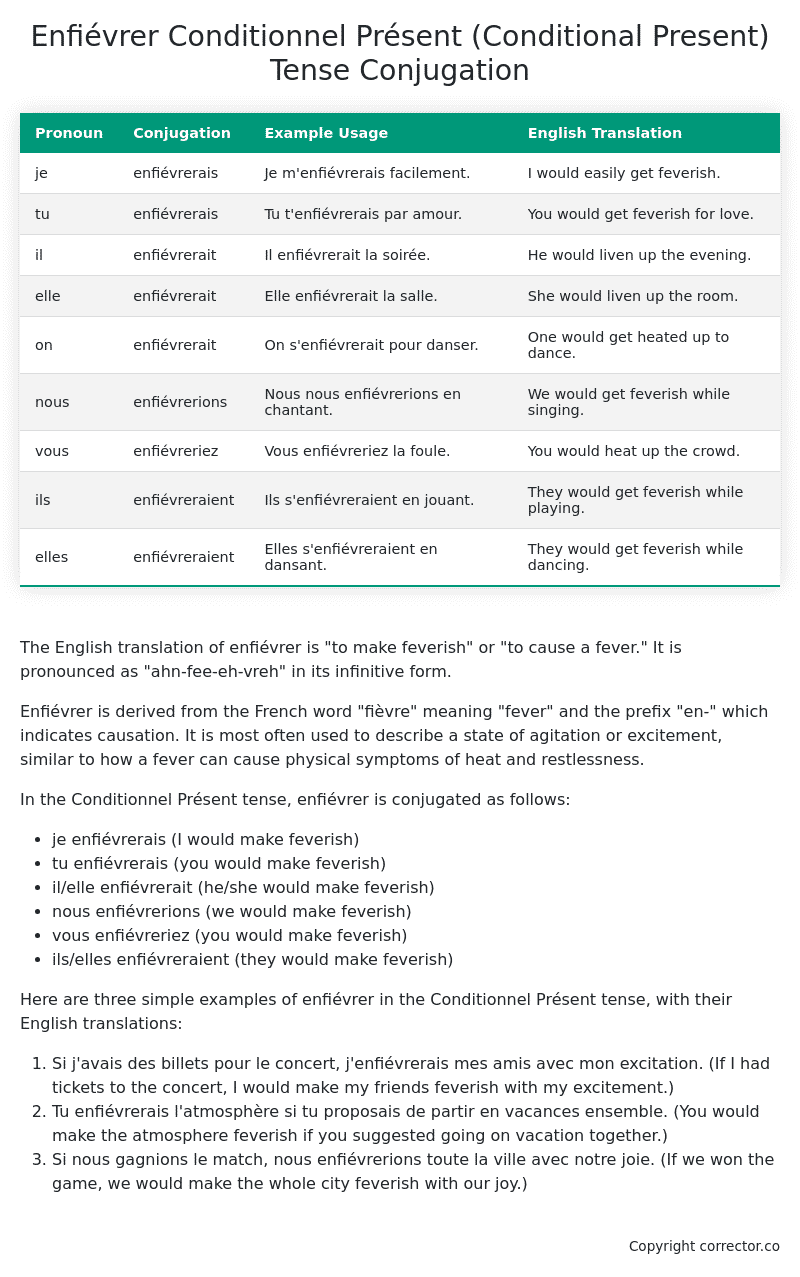Conditionnel Présent (Conditional Present) Tense Conjugation of the French Verb enfiévrer
Introduction to the verb enfiévrer
The English translation of enfiévrer is “to make feverish” or “to cause a fever.” It is pronounced as “ahn-fee-eh-vreh” in its infinitive form.
Enfiévrer is derived from the French word “fièvre” meaning “fever” and the prefix “en-” which indicates causation. It is most often used to describe a state of agitation or excitement, similar to how a fever can cause physical symptoms of heat and restlessness.
In the Conditionnel Présent tense, enfiévrer is conjugated as follows:
- je enfiévrerais (I would make feverish)
- tu enfiévrerais (you would make feverish)
- il/elle enfiévrerait (he/she would make feverish)
- nous enfiévrerions (we would make feverish)
- vous enfiévreriez (you would make feverish)
- ils/elles enfiévreraient (they would make feverish)
Here are three simple examples of enfiévrer in the Conditionnel Présent tense, with their English translations:
- Si j’avais des billets pour le concert, j’enfiévrerais mes amis avec mon excitation. (If I had tickets to the concert, I would make my friends feverish with my excitement.)
- Tu enfiévrerais l’atmosphère si tu proposais de partir en vacances ensemble. (You would make the atmosphere feverish if you suggested going on vacation together.)
- Si nous gagnions le match, nous enfiévrerions toute la ville avec notre joie. (If we won the game, we would make the whole city feverish with our joy.)
Table of the Conditionnel Présent (Conditional Present) Tense Conjugation of enfiévrer
| Pronoun | Conjugation | Example Usage | English Translation |
|---|---|---|---|
| je | enfiévrerais | Je m’enfiévrerais facilement. | I would easily get feverish. |
| tu | enfiévrerais | Tu t’enfiévrerais par amour. | You would get feverish for love. |
| il | enfiévrerait | Il enfiévrerait la soirée. | He would liven up the evening. |
| elle | enfiévrerait | Elle enfiévrerait la salle. | She would liven up the room. |
| on | enfiévrerait | On s’enfiévrerait pour danser. | One would get heated up to dance. |
| nous | enfiévrerions | Nous nous enfiévrerions en chantant. | We would get feverish while singing. |
| vous | enfiévreriez | Vous enfiévreriez la foule. | You would heat up the crowd. |
| ils | enfiévreraient | Ils s’enfiévreraient en jouant. | They would get feverish while playing. |
| elles | enfiévreraient | Elles s’enfiévreraient en dansant. | They would get feverish while dancing. |
Other Conjugations for Enfiévrer.
Le Present (Present Tense) Conjugation of the French Verb enfiévrer
Imparfait (Imperfect) Tense Conjugation of the French Verb enfiévrer
Passé Simple (Simple Past) Tense Conjugation of the French Verb enfiévrer
Passé Composé (Present Perfect) Tense Conjugation of the French Verb enfiévrer
Futur Simple (Simple Future) Tense Conjugation of the French Verb enfiévrer
Futur Proche (Near Future) Tense Conjugation of the French Verb enfiévrer
Plus-que-parfait (Pluperfect) Tense Conjugation of the French Verb enfiévrer
Passé Antérieur (Past Anterior) Tense Conjugation of the French Verb enfiévrer
Futur Antérieur (Future Anterior) Tense Conjugation of the French Verb enfiévrer
Subjonctif Présent (Subjunctive Present) Tense Conjugation of the French Verb enfiévrer
Subjonctif Passé (Subjunctive Past) Tense Conjugation of the French Verb enfiévrer
Subjonctif Imparfait (Subjunctive Imperfect) Tense Conjugation of the French Verb enfiévrer
Subjonctif Plus-que-parfait (Subjunctive Pluperfect) Tense Conjugation of the French Verb enfiévrer
Conditionnel Présent (Conditional Present) Tense Conjugation of the French Verb enfiévrer (this article)
Conditionnel Passé (Conditional Past) Tense Conjugation of the French Verb enfiévrer
L’impératif Présent (Imperative Present) Tense Conjugation of the French Verb enfiévrer
L’infinitif Présent (Infinitive Present) Tense Conjugation of the French Verb enfiévrer
Struggling with French verbs or the language in general? Why not use our free French Grammar Checker – no registration required!
Get a FREE Download Study Sheet of this Conjugation 🔥
Simply right click the image below, click “save image” and get your free reference for the enfiévrer Conditionnel Présent tense conjugation!

Enfiévrer – About the French Conditionnel Présent (Conditional Present) Tense
Formation
Common Everyday Usage Patterns
Expressing Polite Requests
Expressing Hypothetical Situations
Expressing Doubt or Uncertainty
Interactions with Other Tenses
Present Tense
Past Tense
Future Tense
Conditional Perfect
Summary
Want More?
I hope you enjoyed this article on the verb enfiévrer. Still in a learning mood? Check out another TOTALLY random French verb conjugation!


